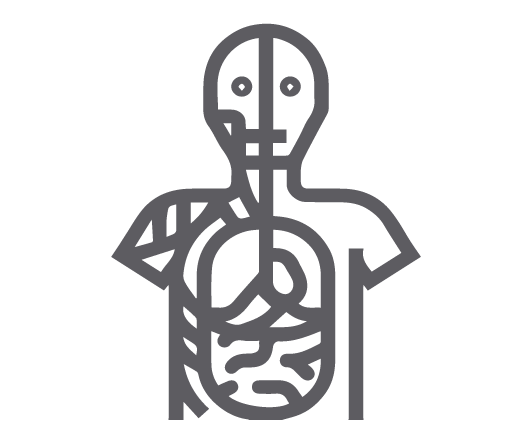Category: Anatomy
Anatomy is the subset of biology that focuses on the physical structure of living organisms. Anatomy is a general term that includes human anatomy, animal anatomy (zootomy) and plant anatomy (phytotomy). Anatomy is closely related to embryology, comparative anatomy and comparative embryology through common roots in evolutionary biology.
-

Histology: Microscopic Anatomy of Human Tissues
•
Histology, the study of microscopic anatomy of tissues, provides a crucial link between cellular biology and gross anatomy.…
-

The Endocrine System and Hormonal Regulation Paper
•
The endocrine system is a complex network of glands and organs that produce, store, and secrete hormones directly…
-

Reproductive System: Anatomy and Function Paper
•
The reproductive system is a complex network of organs and hormones responsible for the continuation of the human…
-

Respiratory System: Structure and Mechanisms Essay
•
The respiratory system is a complex network of organs and tissues that facilitates the exchange of gases between…
-

Digestive System: Anatomy and Physiology Essay
•
The digestive system is a complex network of organs and tissues responsible for breaking down food, absorbing nutrients,…
-

Detailed Analysis of the Skeletal System Essay
•
The skeletal system is a remarkable framework that provides structure, protection, and support for the human body. This…
-

The Role of Connective Tissue in the Human Body Essay
•
Connective tissue is a fundamental component of the human body, playing diverse and crucial roles in maintaining structure,…
-

Comparative Anatomy of Human and Animal Muscles Essay
•
Muscles are essential components of the body that enable movement, maintain posture, and support vital functions in both…
-

Structure and Function of the Nervous System Essay
•
The nervous system is a complex and fascinating network that controls and coordinates all bodily functions, from simple…
-

Anatomy of the Human Cardiovascular System Essay
•
The human cardiovascular system is a complex network of organs and vessels that work in harmony to circulate…
-

How to Reverse Leptin Resistance
•
Leptin resistance is a critical factor in the development of obesity and metabolic diseases. Understanding and addressing leptin…
-

1950s DNA Breakthroughs: Transforming Genetics
•
Introduction Discovery of DNA Structure: Collaborative Genius Impact on Genetic Research and Medicine Case Study: Sickle Cell Anemia…
-

1940s Penicillin Revolution: Transforming Medicine
•
Introduction In the 1940s, a revolutionary change in medical science occurred with the mass production of penicillin, marking…
-

Hottest Topics in Human Anatomy
•
One of the hottest topics in human anatomy is the study of the human microbiome. The microbiome is…
-

Plastic Surgery Essay
•
The desire to appear more attractive is universal, its permeating throughout history and in all parts of the…
-

Sexuality at Different Life Stages Essay
•
Sexuality at Different Life Stages Aerial Familiar PSY265 December 15, 2008 Sex is the one biological process that…
-

Canine Parvovirus
•
References Doctors Foster and Smith. (1997-2009). Retrieved February 12, 2009, from Live Aquaria.com: http://www.peteducation.com/article.cfm?c=1556&aid=467 (2005). The Merck Veterinary…
-

Blood Agglutination
•
Blood agglutination simply refers to the sticking together of erythrocytes as a result of antigen-antibody interaction. Proteins on…
-

Muscular Dystrophy
•
Muscular Dystrophy is a group of inhereted diseases that causes voluntary muscles to progressively weaken, and in some…
-

Temporomandibular Joint
•
The most common cause of facial pain is temporomandibular joint and muscular disorder (TMTJ), which causes recurrent or…
-

Narcolepsy
•
Narcolepsy is a devastating disorder that causes uncontrollable sleepiness and muscle weakness. It is the abnormal, uncontrollable tendency…
-

Essential Guide to Colonoscopy
•
The topic of this interest paper is colonoscopies. I chose this topic because I had to have a…
-

About Preeclampsia and HELLP
•
Preeclampsia, Eclampsia and HELLP syndrome are all serious complications of pregnancy. Preeclampsia is characterized by hypertension, and Eclampsia…
-

Local Anaesthetic Agents – Anatomy Research Paper
•
Local anaesthetic molecules are made of an aromatic group linked to a basic side chain by an ester…
-

pH Levels Differences Between Normal Urine and Diabetic Urine – Human Anatomy Paper
•
pH Levels Differences Between Normal Urine and Diabetic Urine – Human Anatomy Paper Kidneys are bean-shaped organs that…
Recent Posts
Social Media
- African American Studies
- Anatomy
- Anthropology
- Art History
- Astronomy
- Biology
- Book Reviews
- Business
- Chemistry
- Childhood Development
- Communications
- Computer Science
- Creative Writing
- Criminal Justice
- Culinary Arts
- Current Issues
- Dentistry
- Economics
- Education
- Engineering
- English
- Ethics
- Expository Writing
- Film
- Fitness
- Foreign Language
- FORP
- French
- Geology
- German
- Government
- Graduate School Applications
- Graphic Arts
- Health Science
- History
- Humanities
- Information Technology
- International Business
- Law
- Literature
- Management
- Marketing
- Math
- Medicine
- Music
- Nursing
- Other
- Philosophy
- Physics
- Poetry
- Political Science
- Psychology
- Religion
- Scholarship Essays
- Science
- Short Stories
- Sociology
- Spanish
- Sports Science
- The Arts
- Theatre
- Theology
- Undergraduate Admission Essays
- Video Game Design
- Womens Studies